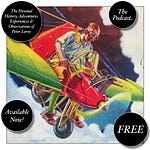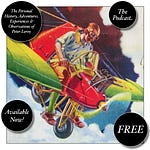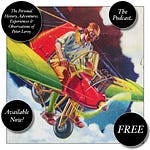21
NEARLY A YEAR PASSED. Over the course of that year’s Saturday visits to the Glynns, a year of drawing lessons and contest entries, I got to know Andy and Rosetta. I learned quite a lot about their remarkable lives, from them, in their own words, and what I learned directly from them taught me how much of what I had thought I knew about them—that is, what I’d learned from my parents and their friends—was wrong.
To be completely accurate, I learned about the Glynns in Rosetta’s words. Since I was as curious a fellow then as I am now, I was always asking her questions. I would ask her about anything that intrigued me, and she would answer me, in her fashion. By that I mean that she would always tell me something in response to my questions, and what she told me was always in some way related to what I wanted to know, but I didn’t always realize at the time what that relationship was. I would ask her the simplest sort of question, and she would use it as a springboard for a leap into the past. It might be something about one of the contests. I might ask: “Do you think I should say anything about the fact that prunes have pits?” or “If you can pack as much as they claim into these suitcases, won’t they be pretty heavy?”
“Ah, prunes!” she would say, and drop her pencil on the table as if something about prunes made her wistful and dreamy, or she would throw her hands in the air and shout, “Suitcases! Luggage! Baggage!” She would sit back and look upward, and she would begin to talk, and after a few words I would understand that she had heard my question as “Tell me about the first time you fell in love” or “Please describe the methods of farming employed in your village when you were a girl.”
Often, she would call for a glass of slivovitz, and I soon learned where it was kept. I would get her tiny tumbler, set it in front of her, fill it, and set the bottle beside the glass, without comment. While Rosetta talked, she sipped. She refilled her glass absentmindedly, and she would go on and on about the dark eyes and reedy voice of her first love or the many aspects of spreading manure that required the grudging labor of a young girl, and then, at a point that I rarely saw coming, the slivovitz would take its toll, her words would begin to run together, and she would sigh and return to the prunes or the luggage or whatever had prompted my question, and tell me that “every happy moment has its pit” or that “when you get to be my age all your suitcases are heavy,” and the story would be at an end.
(As a boy, I tried, for a while, perhaps a year or so before the time when I was hanging around with the Glynns, to get interested in photography, but my interest had to contend with—and was eventually overcome by—a repulsion induced by a lingering association of photography with sickness, and, specifically, with vomit. That association was brought on by the fact that a neighbor—or my mother, or some school chum—had brought me, as a diversion while I was sick with the flu, a stack of library books that included a mildewed copy of a book on photography. When I opened the book it exhaled an odor like the stink that drifts from dark alleys where garbage has been left to ripen. Manfully, I made the effort to read it, or at least leaf through it, since it was a gift and represented affection and concern. I forced myself to overcome my revulsion. I read the book and, to show how grateful I was for the thought behind the gift, labored for a while to become a photographic adept. In the effort, I acquired some basic equipment, turned a portion of my parents’ cellar into a darkroom, and made enough unsatisfactory prints to learn that I would never be much of a photographer. However, along the way, I wrung from the hobby its best metaphoric experiences: the processes of development and printing. After I had developed some understanding of the negative of an image as the inverse of experience and of the positive print of an image gradually appearing on a blank sheet of photographic paper as the revelation of the detailed if often poorly focused truth in what may at first seem a blank and nearly meaningless experience, emerging slowly, as if reluctantly, as if it were being teased, forced, or seduced into revealing itself by the skill, will, or art of the photographer, I felt that I had sufficiently acknowledged the generosity of the gift and sufficiently justified my investment to be free to abandon the effort, and so I did, to the delight of my mother, who found it smelly.)
[to be continued]
Have you missed an episode or two or several?
You can begin reading at the beginning or you can catch up by visiting the archive or consulting the index to the Topical Guide. The Substack serialization of Little Follies begins here; Herb ’n’ Lorna begins here; Reservations Recommended begins here; Where Do You Stop? begins here; What a Piece of Work I Am begins here; At Home with the Glynns begins here.
You can listen to the episodes on the Personal History podcast. Begin at the beginning or scroll through the episodes to find what you’ve missed. The Substack podcast reading of Little Follies begins here; Herb ’n’ Lorna begins here; Reservations Recommended begins here; Where Do You Stop? begins here; What a Piece of Work I Am begins here; At Home with the Glynns begins here.
You can listen to “My Mother Takes a Tumble” and “Do Clams Bite?” complete and uninterrupted as audiobooks through YouTube.
You can ensure that you never miss a future issue by getting a free subscription. (You can help support the work by choosing a paid subscription instead.)
At Apple Books you can download free eBooks of Little Follies, Herb ’n’ Lorna, Reservations Recommended, and Where Do You Stop? and What a Piece of Work I Am.
You’ll find overviews of the entire work in An Introduction to The Personal History, Adventures, Experiences & Observations of Peter Leroy (a pdf document), The Origin Story (here on substack), Between the Lines (a video, here on Substack), and at Encyclopedia.com.














Share this post